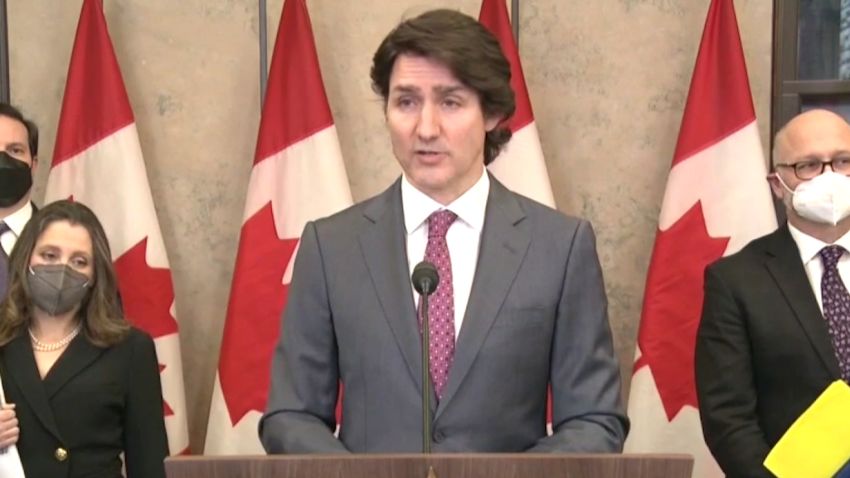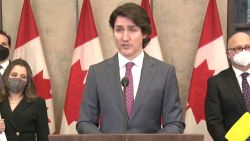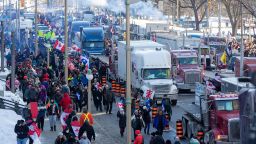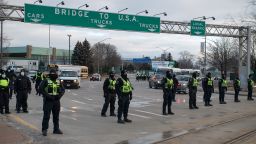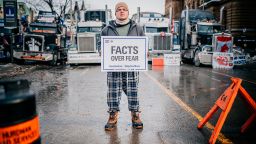The Canadian government is invoking the Emergencies Act for the first time to address the impact of continued protests across the country over Covid-19 health measures, Prime Minister Justin Trudeau told reporters Monday.
The Emergencies Act can provide for the use of the military, but may not necessarily lead to that, and Trudeau said the government is not bringing them in.
But it can temporarily suspend citizens’ rights to free movement or assembly. And the government is taking steps to stop financial support of illegal protests.
The trucker-inspired protests have for weeks disturbed residents in Ottawa’s downtown and recently impeded traffic flow at crossings at the US border.
“This is about keeping Canadians safe, protecting peoples’ jobs and restoring faith in our institutions,” Trudeau said during a news conference in Ottawa, adding that the law will be limited geographically, in scope and in time.
The Canadian law, passed in 1988, states, “For the purposes of this Act, a national emergency is an urgent and critical situation of a temporary nature” that cannot be effectively dealt with under any other law of Canada.”
Trudeau said the government is not overriding the charter of rights and freedoms, nor limiting the right to peaceful assembly. “We are not preventing people from exercising their right to protest legally,” he added.
The news comes after the Ambassador Bridge – North America’s busiest land border crossing – reopened Sunday and Ontario, Canada’s most populous province, announced plans to loosen pandemic restrictions.
For almost a week, protesters blocked the bridge linking Windsor, Ontario, and Detroit – severing the key trade route and dealing economic blows to both the US and Canada.
The bridge reopened Sunday night, allowing “the free flow of commerce between the Canada and US economies once again,” the Detroit International Bridge Company said.
The leader of Ontario announced the next day he plans to drop the province’s vaccine passport requirements on March 1 if its Covid-19 hospitalization rates continue to improve.
“The removal of these measures has always been our objective and something we have collectively worked towards for months now,” Premier Doug Ford announced.
“Let me be very clear: We’re moving in this direction because it’s safe to do so,” Ford said. “Today’s announcement is not because of what’s happening in Ottawa or Windsor but despite it.”
Arrests in Alberta
The Royal Canadian Mounted Police said Monday it has seized 13 long guns, handguns, multiple sets of body armor, a machete and a large quantity of ammunition and high-capacity magazines connected to a small, organized group within a larger protest at the US border crossing in Coutts, Alberta.
The RCMP in Alberta said 11 people were arrested near the border crossing that connects Coutts to Sweet Grass, Montana.
“The group was said to have a willingness to use force against the police if any attempts were made to disrupt the blockade,” the statement said. “This resulted in an immediate and complex investigation to determine the extent of the threat and criminal organization.”
After obtaining a warrant, police were able to search three trailers early Monday that were associated with the group.
The Coutts border crossing is one of several that have been blocked by protesters denouncing Covid-19 mandates.
Personal and corporate accounts can now be frozen, finance minister says
The government is using the Emergencies Act also to go after those who financially support illegal protests, Minister of Finance Chrystia Freeland said at the news conference.
Freeland said financial institutions are being given the power to suspend or freeze personal or corporate accounts they believe are being used to fund illegal protests.
She warned truck owners, for example, that if the vehicle is being used in a blockade, the corporate account can be frozen.
The government is taking action on crowd-funding sites and payment providers, requiring them to register with the Financial Transactions and Reports Analysis Centre of Canada and report any large suspicious donations. Some sites have raised millions of dollars.
“We are making these changes because we know that these platforms are being used to support illegal blockades and illegal activity which is damaging the Canadian economy,” she said.
The protests that have hindered traffic at border crossings has impacted more that $500 million in commerce each day, Freeland said.
Much of that was at the Ambassador Bridge, where 30% of trade by road with the United States crosses, she said. That impacted about $390 million a day, Freeland added.
The impact at the Coutts crossing is $48 million and at one in Emerson, Manitoba, it has been $73 million.
“These costs are real. They threaten businesses big and small, and they threaten the livelihoods of Canadian workers just as we are all working so hard to recover from the economic damage caused by Covid,” she said.
Protesters not just truckers
The “Freedom Convoy” protesters’ grievances stem from Canada’s new mandate requiring truckers to either be fully vaccinated when crossing the Canadian-US border or face a two-week quarantine.
The protest has attracted support from thousands more Canadians – even some who are fully vaccinated but say they want all Covid-19 preventative measures dropped.
About four in every five Canadians are fully vaccinated, Johns Hopkins University data shows. And nearly 90% of the country’s truckers are fully vaccinated and eligible to cross the border, according to the Canadian government.
Among the relaxed restrictions on tap in Ontario are the removal of some event capacity limits as soon as Thursday. Ontario also has a goal to “lift proof of vaccination requirements for all settings” on March 1.
But Ontario residents must still wear masks “for just a little bit longer,” Ford said.
“This is an important layer of protection that will allow us to proceed with our reopening plans.”
Canada’s capital gets flooded by protesters
Members of the protest convoy have blocked Ottawa’s downtown core and impeded border crossings between Alberta and Montana; Manitoba and North Dakota; and British Columbia and Washington state.
Truckers and their supporters have gathered in Ottawa since January 29 to rally against mask mandates, lockdowns, restrictions on gatherings and other Covid-19 preventative measures.
Protesters will remain in the capital city “for as long as it takes for governments across Canada to end all mandates” associated with Covid-19, Freedom Convoy organizers said earlier this month.
But Ottawa Mayor Jim Watson said Sunday that he had reached an agreement with organizers for them to leave residential areas of downtown and restrict their demonstrations to streets directly in front of Canada’s national parliament.
Residents this month have reported rock throwing, property damage and harassment by protesters. Police said they had opened dozens of investigations, including into alleged hate crimes.
Some downtown Ottawa businesses have had to shut down temporarily.
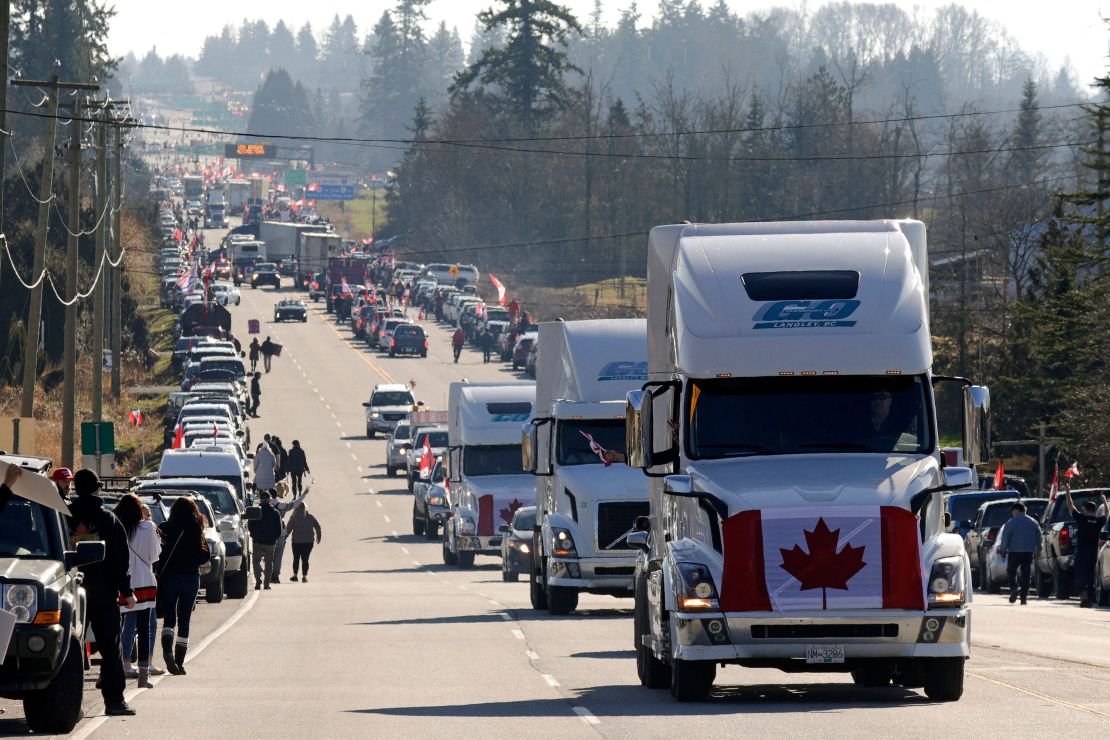
American officials worried similar protests could soon erupt in the US – perhaps near Sunday’s Super Bowl in Southern California. And right-wing media outlets have raised the prospect of like-minded rallies in the US and offered positive coverage of those in Canada.
But, so far, the border blockades have been concentrated on the Canadian side.
CNN’s Paula Newton, Raja Razek, Steve Almasy, Paradise Afshar, Joe Sutton, Theresa Waldrop and Paul P. Murphy contributed to this report.

